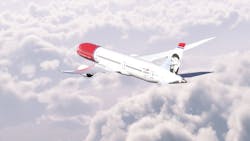Norwegian Air Continues to Reduce Emissions Up to 200,000 Tons Per Year with Upgraded Technology
Norwegian Air, the World’s Best Low-Cost Long-Haul Airline, continues to reduce emissions with upgraded weather service provided by AVTECH Sweden AB, which offers unique and sustainable solutions within digital Air Traffic Management. The enhanced platform can help reduce CO2 emissions by an additional 10,000-15,000 tons per year. In the past few years, Norwegian has taken several steps to create a more sustainable aviation industry and collectively these initiatives contribute to an annual CO2 reduction of up to 200,000 tons. The airline has also been named the Most Fuel Efficient Airline on Transatlantic Routes twice by an independent organization, the International Council on Clean Transportation.
The weather service by AVTECH provides Norwegian pilots with advanced data, enabling them to optimize the flight paths for improved fuel efficiency and reduced emissions.
Norwegian has reduced 16,000 tons of CO2 emissions per year since the launch of its cooperation with AVTECH in 2018. The company’s latest product, Aventus Cruise Optimizer, can further reduce CO2 emissions by 10,000-15,000 tons per year. The fuel-saving measures that Norwegian has adopted combined with utilizing the latest technology in flight planning and operations, has reduced the company’s annual emissions by up to 200,000 tons.
“During the test project, there was a marked efficiency improvement in the planning of flight paths, which resulted in further fuel and emissions reductions. Each kilogram of fuel saved makes a difference. At Norwegian, we’re actively working to implement new technology in our modern and fuel-efficient fleet to continue reducing emissions,” said Stig Patey, Fuel Saving Manager at Norwegian.
The new and upgraded Cruise Profile Optimizer has been developed to further optimize flights and analyze more data than the previous product. The optimizer calculates the most fuel-efficient altitude depending on the prevailing winds and aircraft performance, including analyzing the number of passengers, distance, altitude, and speed. In short, the more data that is provided, the more fuel-efficient flight paths can be flown, which in turn produces fewer emissions. In addition, the pilots receive real-time information which makes it possible to adjust the altitude if the weather conditions change during the flight.
The upgraded weather service has already been implemented on Norwegian’s Boeing 737-800 fleet.
At the end of 2019, Norwegian implemented SkyBreathe which is another fuel and emission-reducing tool. The SkyBreathe application leverages Big Data algorithms developed through an EU-funded Clean Sky Project. Norwegian reduces emissions by 140,000 tons per year with SkyBreathe.
”We’re very pleased that our cooperation continues to benefit Norwegian by reducing both fuel consumption and emissions. We look forward to future cooperation with more innovative projects,” said David Rytter, CEO of AVTECH Sweden AB.
Norwegian actively strives to reduce environmental impact from aviation. New aircraft and new technology are the most important measures an airline can undertake to reduce emissions. Norwegian has one of the youngest fleets in the industry with an average age of 3.8 years.
